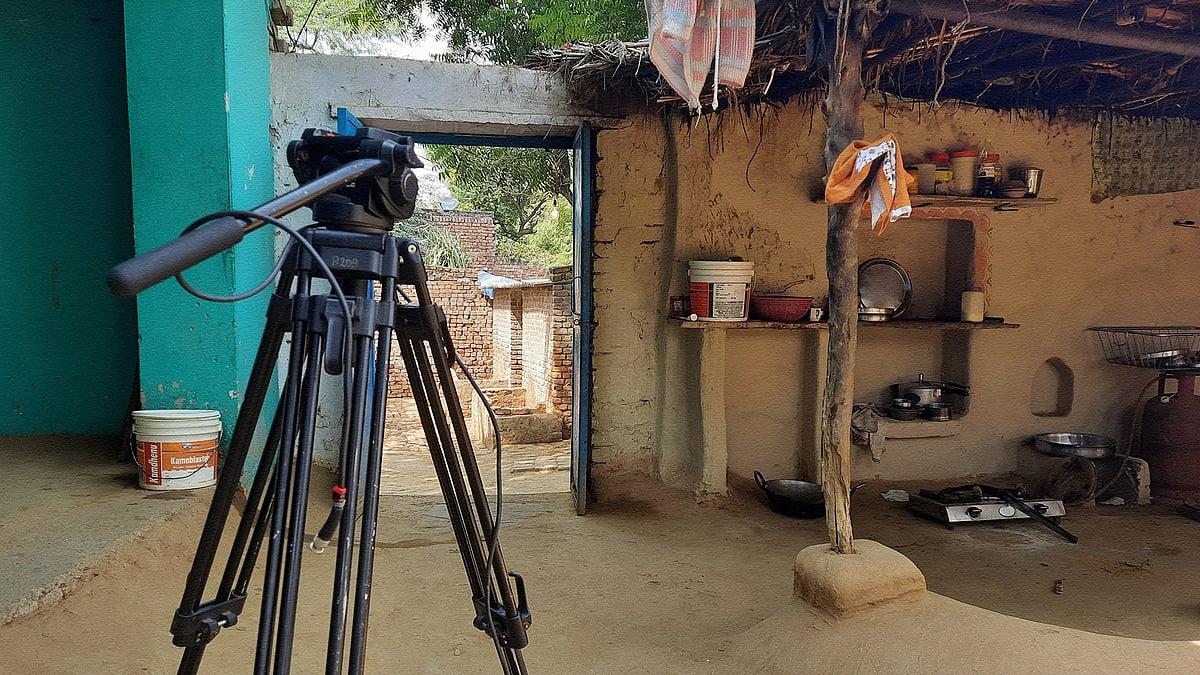Hathras: Four months on, Dalit girl’s family lives between court hearings and with ostracism
The media and police have left, leaving the family to pick up the pieces.
The tall bajra crops have been scythed for harvest. Short green potato plants now occupy the land.
Things have changed in Hathras. It’s been close to four months since the gangrape and murder of a 19-year-old Dalit girl, Asha, in the bajra fields of Chanda village, which lies in Hathras district of western Uttar Pradesh.
The field in which Asha was gangraped on the morning of September 14, 2020, lies barren and ignored. Nothing grows there. The CBI has sealed it.
Asha died on September 29. Four Thakur men – Sandeep, Ravi, Ramu and Luvkush – have been arrested.
“I don’t go that side anymore unless I am asked to reconstruct the day of her rape,” her mother said.
Weight of sadness
Four months on, the relatives have departed for their own homes. The house in which Asha once lived is now occupied by her parents, her two brothers, a sister-in-law, and three nieces.
“This is a house that functions mechanically,” said Asha’s father, sitting on a charpoy. “We sleep because it is night and we wake up because it is day.”
He picked up Asha’s five-year-old niece and placed her on his lap. “You know, when Asha was in the hospital...Even in that terrible condition she just wanted to see this little girl,” he said, tears rolling down his cheeks. “She kept telling me, ‘Papa, take me home. I want to play with Aditi again.’”
As with every other family member in the house, Asha’s three nieces all hold onto memories of their aunt, in their own way. Aditi was playing outside the house on the day Asha was raped. “She heard us scream, she saw Asha naked, bleeding and strangulated when we brought her inside,” said Aditi’s father, Asha’s brother. “It scarred her. Sometimes, she wakes up and cries at night. She has been robbed of her innocence in every way.”
Did Aditi comprehend what had happened to her aunt? “Yes, in whatever way a five-year-old can,” her father said. “In fact, the CBI questioned her too.”
As we spoke, Asha’s three-year-old niece playfully covered her head and face with a white towel. Lifting her make-believe veil, she said, “Bua, bua.” Bua is aunt, father’s sister.
The family laughed and Asha’s brother said, “She does this all the time. This is how she remembers Asha. She also thinks every young woman who comes home is Asha.”
The third niece was only 11 days old when Asha was gangraped.
“When it all happened and our house was so crowded with the media, police, and other people, it was so difficult for us to pay attention to our newborn,” her father said. “Of course, she is a baby and doesn’t understand anything. But we keep feeling like we couldn’t give her what a newborn child needs in those crucial months after birth.”
Asha’s mother now spends her days attending to her three grandchildren. “I struggle to sleep because Asha and I used to go to bed at the same time every night,” she said. “Sometimes I feel delusional because I can see Asha running around, playing with the children during the day.”



Before Asha’s death, the family owned five or six buffalos. Those were sold, and they currently have one buffalo and a calf. They also gave half their land to a relative to farm. Both Asha’s brothers can no longer go to work because they have to attend court hearings.
They also worry about their safety. A few months ago, Asha’s brother said, a large group of Karni Sena members wanted to visit them. The organisation subscribes to the view that Asha’s death was a case of honour killing, and had demanded that her family be killed.
“Finally, the police stopped the large group and escorted their leaders to our house. If they had all come here, they would have killed us, I’m sure,” the brother said, adding that such threats have become common since the incident.
“Life has changed so suddenly for all of us,” Asha’s father said. “We try to pass our time counting the days to the next court hearing.”
Security and betrayals
In the days following Asha’s gangrape and subsequent death, the road leading to her house was littered with plastic cups and dotted with media and police personnel. It’s now empty, apart from around 15-20 Central Reserve Police Force personnel.
On October 27, the Supreme Court said that Asha’s family, as witnesses, must be provided security by the CRPF instead of the UP Provincial Armed Constabulary, or PAC, which had been guarding the family since September. The transition took place on November 1 and the CRPF continues to stand guard. They have built three plastic bunkers: one in the outhouse area, another at the entrance of the house, and a third on the roof. The metal detector at the entrance of the house is one of the few remnants of the PAC’s presence.
Asha’s family said they feel safer with the CPRF than the PAC. Her older brother, who walked me into the house, said, “We had no faith in the UP police. Half the time, we were scared of them. They spoke to us very rudely and let anyone inside the house.”
The brother said the CRPF personnel were “very considerate”, “did not disturb the family”, and always checked with them before letting in a visitor.
The family has good reason to mistrust the UP police. Asha’s body was forcibly cremated by the police without a single family member being present. The police had claimed Asha wasn’t raped and that the incident was part of an “international plot” to defame the Uttar Pradesh government.
On October 2, days after Asha’s death, the district magistrate of Hathras, Praveen Kumar Laxkar, was caught on tape threatening the family and asking them to comply with the UP police. On December 31, after much debate, he was transferred to Mirzapur.
Does this make the family feel better?
“No, what sort of reassurance should that give us?” said Asha’s older brother. “He should be terminated from his post. Until then, there won’t be justice.”
The family had also wanted an investigation headed by a retired Supreme Court judge; in October, they had opposed the CBI investigation ordered by Uttar Pradesh chief minister Ajay Bisht. Nevertheless, the CBI did take over the investigation and concluded in two months that Asha had been gangraped and murdered and that the four accused must be convicted.
“In a way, we are relieved with the CBI’s conclusions,” said Asha’s father. “But we want the case to be transferred out of Uttar Pradesh now. We don’t trust anything here.”
This is something else the family has been asking for since October: that the trial in the case be transferred out of the state. On October 27, the Supreme Court had assured the family the transfer plea would be considered after the CBI probe. The family awaits this now.
Progress of the case
On December 18, 2020, the CBI concluded its investigation. A 2,000-page chargesheet was handed over to the lawyers of the victim and the four accused on Monday, January 4, 2021.
With regards to Asha, there are two simultaneous cases going on. The first, of her gangrape and murder, is at the district court. The second is at the Lucknow bench of the Allahabad High Court, which took suo motu cognizance of the case, and is looking into her forced cremation and the role of state officials in botching the investigation.
On Monday, the four accused – Sandeep, Ramu, Ravi and Luvkush – were produced in court before special judge BD Bharti. Munna Singh Pundir, the lawyer appearing for all four, said the court heard no arguments and fixed the next hearing for January 29.



“Even though the families of all four accused were there, the men could not meet them,” he said.
Newslaundry met the families of the accused at their home in Hathras, after they had returned from the district court. But they refused to speak.
“We don’t want to speak to the media,” said Luvkush’s mother. “You let us down.”
Pundir said the court also gave special directions to the media. “The judge clearly said the media must not analyse the trial or the evidence, and must stick to pure reporting,” he said.
A silent village
A local reporter who refused to be named visits Asha's family almost everyday.
“This is a quiet village. Nobody had even heard of Hathras before this case and now it will always be known for this,” he said.
He added that among local reporters, there’s still a consensus that this was a case of honour killing. “Why didn’t she say she was raped immediately? Why did it take so long?” he asked. When asked about the CBI investigation concluding that Asha had been gangraped, he said, “It’s all a political gamble.”
Asha’s village is physically divided on caste lines. Her family is Dalit, belonging to the Valmiki caste. Apart from four Valmiki families, the village is occupied by Pandits and Thakurs.
For a month, after Asha’s case became a cause for national outrage, the village was flooded with reporters trying to speak to everyone. Back then, villagers had shut their doors, police personnel patrolled the lanes 24 hours a day, and villagers had been told by the police to refrain from speaking to the media.
Now, the police have left. Barring the CRPF men and their bunkers outside Asha’s house, a sense of normalcy has returned to the village. Until, that is, they see another reporter. Once again, the doors shut and the villagers refuse to speak.
Anupam, a local who reluctantly spoke to Newslaundry, said she never knew Asha.
How come?
“We’re Thakur and they’re Valmiki, why would I speak to her?” she said. When asked if Asha’s gangrape has made the women of the village scared or apprehensive, she said, “When no rape has happened, why will we feel scared?”
A group of men sitting outside a house asked me who I was and which channel I worked for. Refusing to be named, one of them quietly said, “We have lost faith in the CBI. They said she was raped. How can they say that when it’s a clear case of honour killing?”
Meanwhile, Asha’s family feels more ostracised than before. “Earlier, people didn’t speak to us because we were Dalit,” her father said. “Now they reject us because our daughter got raped.”
Had they thought about leaving the village?
“Yes, we thought of it for some time. But where will we go?” he said. “We were born Valmiki and grew up in this environment of rejection. Our caste and now the identity of being a rape victim’s family is not going to change by shifting houses, right?”
As I prepared to leave Asha’s house, her father stopped me. “How long after the rape were Nirbhaya’s rapists hanged?” he asked.
Seven years and three months, I replied.
“Well,” he sighed, “I guess it will be a long time before I sleep peacefully then.”
The names of the victim and her family members have been changed to protect identity.
 Amidst slander and constant vigil, Hathras victim's family seeks closure
Amidst slander and constant vigil, Hathras victim's family seeks closure From indifference to victim-blaming: Why the mainstream media’s coverage of Hathras is unsurprising
From indifference to victim-blaming: Why the mainstream media’s coverage of Hathras is unsurprising